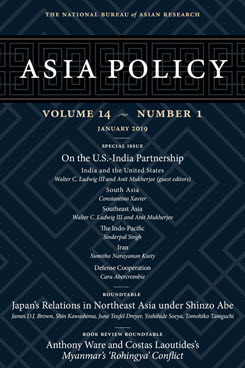The Indo-Pacific and India-U.S. Strategic Convergence
An Assessment
This article examines Indian and U.S. perceptions of the Indo-Pacific, the extent of their strategic convergence and cooperation in this region, and the manner in which key states in the region have responded to this seeming convergence.
Executive Summary
MAIN ARGUMENT
The strategic basis of the Indo-Pacific is constructed, to a significant degree, on the apparent strategic convergence between India and the U.S. According to several accounts, this strategic convergence is driven to a large extent by the two countries’ shared concerns about China’s growing geostrategic ambitions across both the Pacific and Indian Oceans. The reactions of certain key states in the region, including China, Japan, Australia, and Indonesia, are often cited as evidence that the Indo-Pacific is a key site for India-U.S. strategic convergence. However, such assessments do not pay enough attention to several significant divergences between India and the U.S. in relation to the region. Most fundamentally, India and the U.S. have differing geographic conceptions of the Indo-Pacific with important implications for broader strategic convergence between the two states.
POLICY IMPLICATIONS
- Differences over the geographic scope of the Indo-Pacific reveal differences in strategic priorities between India and the U.S., potentially undermining broader policy convergence.
- Managing China’s rise within seemingly more inclusive institutions and processes appears vital for obtaining greater policy convergence from other key Indo-Pacific states.
- The U.S. and India do not demonstrate strong common positions on key issue areas vis-à-vis China in the Indo-Pacific, presenting obstacles for coordinating military and diplomatic strategies.
Sinderpal Singh is a Senior Fellow in the South Asia Programme in the S. Rajaratnam School of International Studies (RSIS) at Nanyang Technological University in Singapore. His research interests include the international relations of South Asia, with a specific focus on Indian foreign policy and Indian Ocean security.
About Asia Policy
Asia Policy is a peer-reviewed scholarly journal presenting policy-relevant academic research on the Asia-Pacific that draws clear and concise conclusions useful to today’s policymakers. Asia Policy is published quarterly in January, April, July, and October and accepts submissions on a rolling basis. Learn more


